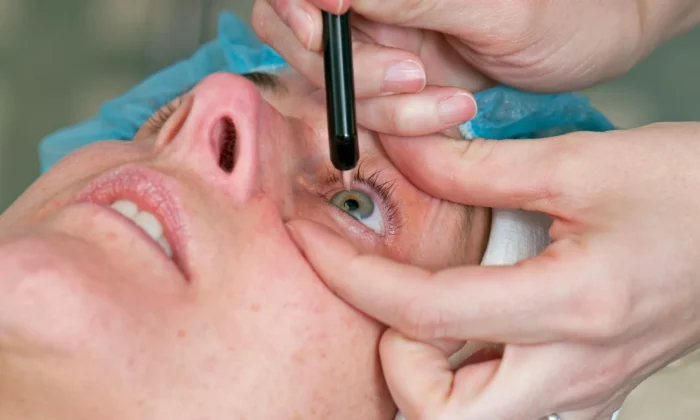Are you on the brink of a life-changing decision to say goodbye to your glasses? PRK might be on your radar, and if it is, there’s no doubt you’ve pondered the potential pain and disadvantages. Just like with any procedure, being informed is paramount. In this blog, we’ll take a deep dive into the world of PRK and Trans-PRK surgeries. From understanding the rare disadvantages to gauging the actual pain levels, we’ve got you covered. So, let’s embark on this enlightening journey together and uncover the truths about PRK!
Contents
What is PRK Surgery? A Quick Overview
Photorefractive Keratectomy, commonly known as PRK, is one of the earliest types of laser eye surgeries devised for vision correction. Before the emergence of popular procedures like LASIK, PRK was the go-to choice for many. In this procedure, the surgeon uses a laser to reshape the cornea’s surface, which in turn helps in correcting vision issues like nearsightedness, farsightedness, and astigmatism.
Unlike LASIK, where a flap is created on the cornea, PRK involves removing the thin outer layer of the cornea, allowing it to regenerate post-surgery. It’s a trusted method with proven results, but like all medical procedures, it’s essential to understand its full scope, including any potential downsides. Let’s delve deeper into the possible disadvantages and set realistic expectations.
Debunking the Myth: PRK Surgery is Painful
 PRK surgery has gained immense popularity over the years, thanks to its promising results in vision correction. However, as with many medical procedures, myths and misconceptions surround PRK – one of the most prevalent being that PRK surgery is unbearably painful. Let’s set the record straight.
PRK surgery has gained immense popularity over the years, thanks to its promising results in vision correction. However, as with many medical procedures, myths and misconceptions surround PRK – one of the most prevalent being that PRK surgery is unbearably painful. Let’s set the record straight.
- Advanced Techniques: Surgeons now use state-of-the-art equipment and techniques that make the procedure more precise and minimize discomfort.
- Anesthetic Eye Drops: Before the procedure begins, anesthetic eye drops are applied to numb the eyes. These drops ensure that patients feel no pain during the surgery.
- Proper Aftercare Reduces Discomfort: Following the surgery, adhering to the prescribed aftercare routine – like using medicated eye drops and avoiding eye strain – can significantly mitigate any discomfort. Many patients find relief and expedited healing by simply following their surgeon’s advice.
While PRK surgery does come with its set of post-operative sensations, equating the experience to severe pain isn’t accurate. Thus, PRK Surgery is not painful at all! If you’re considering PRK, it’s essential to have an open discussion with your surgeon, understand the realities, and not be swayed by prevailing myths.
PRK Pain: Immediate Post-Operative Experience
 For those venturing into the world of vision correction, understanding post-operative sensations is crucial. PRK surgery, although highly effective, does come with its set of immediate post-operative sensations.
For those venturing into the world of vision correction, understanding post-operative sensations is crucial. PRK surgery, although highly effective, does come with its set of immediate post-operative sensations.
After the PRK procedure, it’s not uncommon for patients to experience a certain degree of discomfort or even pain. Here’s what you might expect:
- Burning or Itching Sensation: Shortly after the surgery, you might feel a mild burning or itching sensation in your eyes. This feeling usually lasts for a few hours and is a result of the healing process that starts almost immediately after the procedure.
- Foreign Body Sensation: Some patients describe feeling as if there’s something in their eye – like a grain of sand or an eyelash. This sensation, termed as a “foreign body sensation,” can be mildly uncomfortable but usually subsides within a day or two.
- Tearing & Light Sensitivity: Your eyes might water more than usual, and you could experience heightened sensitivity to light. Wearing sunglasses can help manage this sensitivity, and it’s generally a good idea to rest your eyes as much as possible.
- Blurry Vision: Don’t be alarmed if your vision is a bit hazy or blurry right after the surgery. This blurriness is a temporary side effect and should gradually improve as your eyes heal.
It’s worth noting that these sensations vary from person to person. While some might experience mild discomfort, others might find it a bit more intense. However, these immediate post-operative feelings are temporary and tend to improve significantly after the first few days.
Additional PRK Disadvantages Beyond Pain
While the potential for discomfort post-surgery often garners the most attention, it’s crucial for potential PRK candidates to be aware of other potential drawbacks. Here’s a look at some non-pain-related disadvantages of PRK surgery:
Prolonged Recovery Time
- Unlike some other refractive surgeries like LASIK, PRK comes with a slightly longer recovery period. While the surgery itself might be quick, full visual recovery can take a week or longer.
- During the initial days post-surgery, blurred vision is common as the corneal surface heals and re-epithelializes.
Potential for Corneal Haze
- Some patients might experience what’s known as “corneal haze” after PRK. This refers to a cloudy appearance of the cornea, which can temporarily affect vision quality.
- Although this is more common in surgeries from decades past, advancements in PRK techniques and post-operative care have significantly reduced its occurrence. Plus, in most cases, this haze is temporary and resolves on its own or with the help of steroid eye drops.
Risk of Infection
- As with any surgical procedure, there’s a risk of infection after PRK. It’s crucial to adhere to post-operative care, use prescribed eye drops, and avoid rubbing the eyes to prevent this.
- The incidence of infection is relatively low, and with prompt intervention, it can be managed effectively.
Prescription Regression
- Even after a successful PRK procedure, there’s a chance that the vision can regress over time. This means that the eyes might drift back towards their original prescription.
- Regression can be influenced by various factors including the initial prescription strength, age, and individual healing patterns.
- In cases where significant regression occurs, a touch-up or enhancement procedure might be recommended.
Sensitivity to Light
- After PRK, patients might experience increased light sensitivity, especially in bright environments. Wearing sunglasses and avoiding direct sunlight can help manage this in the initial post-operative period.
Dry Eyes
- Temporary dry eye symptoms can manifest after PRK. While this is generally short-lived, it’s essential to use lubricating eye drops as recommended by the surgeon.
While these disadvantages might sound concerning, it’s worth noting that they are relatively rare and often manageable. The key lies in choosing a skilled surgeon, understanding the procedure fully, and adhering to post-operative care diligently.
Making an Informed Choice: Is PRK Right for You?
The journey to better vision is a deeply personal one, and the choices you make should align with your unique needs and circumstances. PRK surgery, like all medical procedures, comes with its set of pros and cons. Understanding both sides of the coin will empower you to make a decision that aligns with your vision goals and comfort levels.
- PRK has transformed the lives of many, offering clearer vision without the need for glasses or contacts. The procedure’s track record of safety and effectiveness is well-documented.
- While the immediate post-operative discomfort and the potential risks mentioned earlier are worth noting, it’s essential to balance these against the benefits.
- After gathering all the information, take a moment to listen to your intuition. Are you comfortable with the procedure? Do the potential benefits outweigh the drawbacks for you? Your comfort and confidence in the decision are paramount.
Remember, while PRK has its set of disadvantages, it remains a transformative choice for many seeking clearer vision. By arming yourself with knowledge, consulting with experts, and assessing your comfort levels, you can make an informed decision that could potentially change the way you see the world.
Conclusion
Navigating the world of vision correction can be overwhelming with the myriad of choices available. However, being well-informed about procedures like PRK can significantly assist in making the best decision for your vision needs. While PRK offers numerous advantages, it’s essential to be aware of potential disadvantages and risks. Balancing these factors and consulting with specialists will lead you toward the best path for clearer sight. And if PRK isn’t right for you, there are always other avenues to explore.
Are you considering Lasik surgery? Dive into a life where glasses or contact lenses don’t limit your vision. Experience the freedom of crystal-clear sight with Lasik Surgery at EyeMantra. Book your free appointment now at 9711116605 and take the first step towards a brighter visual future!



